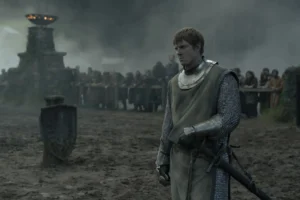Summary
It is an honest story of a boxer journeyman wrapped in the turmoil of poverty and immigration.
Although the Polish movie Boxer (or Bosker) is not based on a true story, it’s influenced by the time period it is set in. Between 1952 and 1989, Poland was referred to as the Polish People’s Republic and subjected to the rule of the USSR. While not true, the movie makes it explicit that the themes and plot could be reflective of Polish citizens.
It’s not the rags-to-riches stories that you expect the movie to be. Boxer gives a premise with the hopes of a Rocky franchise, but it’s surprisingly way more serious and grim. There’s a dream versus reality spectrum based upon the main character, who is desperate to remove himself from the poverty of Poland to lead a better life.
Jedrzej (Eryk Kulm) is the boxer in the story. His inspiration to fight comes from his father, who had a passion for the sport but fell out of love due to a significant event in his life. His father chose family over fighting and encouraged his son to educate himself for a better life instead.
Jedrzej is young and intelligent, but his fate lies in boxing based on bloodline. He is finally coached by his uncle Czesiek (Eryk Lubos), who has a history with his father. Sport and love combine as Jedrzej meets his wife, Kasia (Adrianna Chlebicka). They take a massive risk and immigrate to London despite the dangers of leaving the rule of the USSR.
Jedrzej believes he can become a world champion, but the reality of his circumstances and abilities appear harder than he thought.
This is a real story. While I wished there was more focus on boxing, the life choices of the lead character make it compelling viewing. I felt engrossed by the sustained failure of a boxer trying to become a world champion while competing with the aggressive nature of poverty. There’s a meaning in Boxer that leans toward immigration, a fact that leaving poverty does not mean poverty leaves you, and that’s the cornerstone of the story.
His wife, Kasia, is a significant counterpart, too. She’s a partner expected to support her man as he tries to achieve his dreams, bringing her a better life. What overpowers the couple is the fact of life; when family becomes a significant core of your relationship, decisions have to be made, regardless if your athletic abilities return dividends or not.
The director chose such a grim outlook on life in Boxer that I’m not sure he likes success stories at all. I’m fondly reminded of La La Land, where Damien Chazelle believes two people cannot have love and success in equal fitting. Mitja Okorn clearly has a vested interest in the real world of boxing and journeymen, compounded by the stakes given to them by communist Poland.
The real turning point of Boxer and the trigger for the central premise is when Jedrzej decides to take a rigged fight, with the pressures of taking hold. The Polish movie tests the character, providing a potential rags-to-riches scenario even the humble would be tempted to take.
However, the director highlights the desperation of poverty, how it seeps into the vulnerable, and how opportunities are taken without a second thought, resulting in an imbalance of ethics in some scenarios. He’s humanized the true nature of immigration in a tense period of history.
Boxer is not the generic fighting movie you expect it to be, and nor is it Rocky. It’s gritty, honest, and truthful, and it illuminates a grim period in Poland that caused one million people to leave the country in the 1980s.
Read More: Boxer Ending Explained




